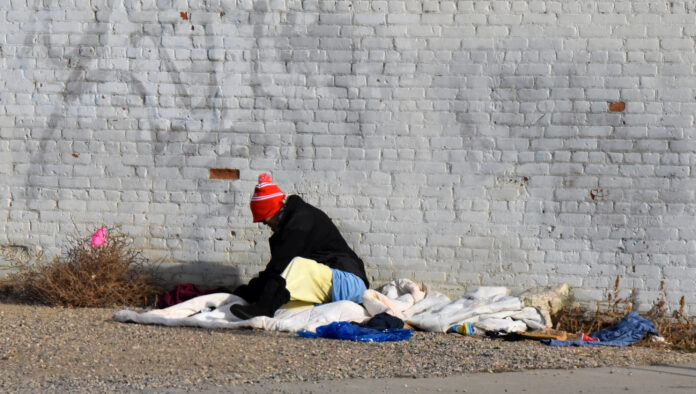Two of the leaders for the development of social housing and homelessness supports in Prince Albert are warning that if a cold weather shelter is not opened soon, many disadvantaged people will be at risk.
“This is a disaster in the making that may return us to the dark days of 2012 when three people froze to death in the winter,” reads a media release from River Bank Development Corporation Manager Brian Howell and YWCA Executive Director Donna Brooks.
Currently, there is no cold weather shelter for homeless individuals in the city and no men’s shelter at all. Howell and Brooks are encouraging discussion between senior levels of Government, who they say are all well aware of the issue, to quickly develop some solutions before winter is upon the City.
Howell also mentioned that members of the community are welcome to join them to brainstorm ideas and find funding to help take care of the City’s most vulnerable.
“We’ve had a number of plans in place and things that were being worked towards and it hasn’t really gone that well to be honest,” said Howell.
For two years during the COVID-19 pandemic, the YWCA, Prince Albert Grand Council, River Bank Development, the Community Advisory Board on Homelessness and the Prince Albert Exhibition Association collaborated to fund and operate a cold weather shelter at the Prince Albert Exhibition grounds. Since the Association decided to step back from the project and use the space for other things, the grounds are no longer an option.
Howell had hopes that Christian non-profit group The Mustard Seed would have their homeless shelter running before winter, but the option doesn’t seem to be available after their proposal was turned down by City Council over disagreements of the suggested downtown location.
The current homeless situation in the City is different then anything they’ve faced in the past few years, according to Howell.
“The number of homeless people in Prince Albert have increased exponentially,” said Howell. “We’re seeing things here that we haven’t seen before, with shopping carts, people camped in entrances, more encampments, big groups of people around businesses and that sort of thing.”
With the influx of people coming to Prince Albert from northern communities to shop or attend school, many Individuals facing difficulties such as mental health or addiction are also migrating to the City.
Howell said the pandemic may have also contributed to the rising homeless population over the last number of years.
“Couch surfing has always played a big role in managing homelessness in Prince Albert. We’re not sure what happened with that, whether there was a breakdown in that system because people were afraid of having outsiders in their homes, there’s any number of possibilities.”
Howell mentioned the Point-In-Time (PIT) Count of people on the streets in both Saskatoon and Regina has more than doubled since last year.
According to the Canadian Observatory on Homeless website, one of the best and most verifiable methods of determining the number of homeless individuals in a community is through the use of PIT Counts. It is a measure of the number of homeless people on a specific day, like taking a snapshot of the situation.
The groups in Prince Albert that provide services for people on the streets like the YWCA, River Bank Development, and PAGC no longer have the capacity to deal with the numbers they are seeing.
“We really need to come up with a long-term solution,” Howell said. “That long-term solution would be a bigger shelter, 40 to 60 beds, operated by someone locally… hopefully an Indigenous organization.”
Brooks said it has been challenging to set up a permanent, sustainable overnight homeless shelter in the City. There are a few overnight shelters that run in Prince Albert for women, youth and children, but it’s a struggle finding supports for men and the other people that don’t fit in the shelters that currently operate.
Howell said something needs to be done to keep people out of the cold before the city is faced with the trauma of cold weather deaths.
“It’s terrible for the people that die and it’s terrible for the community who has to look itself in the eye and say, ‘even though we knew this was coming, we didn’t make sure that we had a place for these people to stay warm during the winter’.”
“Nobody in our country deserves to go hungry or freeze to death, regardless of where they’re at,” said Brooks. She added that the YWCA will support and try to help any organization, preferably an Indigenous one, that sets up a shelter.
The amount of funding needed depends on what kind of shelter the organization is looking to operate, said Brooks. Whether that be a cold weather shelter that operates seven months of the year, a year-round shelter, only overnight or 24-hours.
According to last year’s data taken from Stepping Stones, the overnight cold weather shelter that ran out of the Prince Albert Exhibition Grounds, the budget to operate is around $400,000 to $500,000.
There are a few services currently available in Prince Albert for those facing homeless. The YWCA is a 24-hour shelter for women, children and youth and there are beds available to the Social Detox Center at the Victoria Hospital for intoxicated individuals. PAGC operates the Moose Lodge at the Union Center and they provide a daytime warming centre, meals and clothing from Monday to Friday. Some churches and faith groups also provide meals during the week and on weekends.


